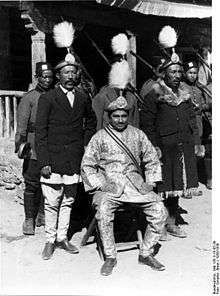Bista
'Bisht (Nepali: बिष्ट) is a family name of people of Nepal belonging to Khas people[1] group under the caste Chhetri,[2][3] sub-groups of Kshatriya varna. They are Hindu with a local Masto deity. They speak Nepali language as mother tongue. In India Bista/Bistas are spelled as Bisht/Bishts or Bist/Bists and are titled as Rajputs. They are mostly found in Indian state of Uttarakhand.[4][5]
| Language(s) | , Garhwali |
|---|---|
| Origin | |
| Derivation | Bishista (Distinguished) |
| Meaning | Baron or landholder[1] |
| Other names | |
| Variant form(s) | Bist, Bishta, Bisht |
| Derivative(s) | Bista Kshatri/Chhetri |
| See also | Thapa, Basnet, Pande, Kunwar, Khadka, Karki |
Naming and Status

Bista is literally translated as Baron or landholder.[1] Bista is also referred as high caste group. For example; Chauhan in Eastern Nepal were referred as Bista in an explanation of assault of a Chauhan man by a Dalit man where governmental orders of capital punishment was given to the Dalit man on Poush Badi 12, 1882 V.S. (1826 A.D.) on the grounds of assaulting a high caste citizen.[6] The excerpts from the royal orders to Bichari (Judge) Shivanidhi Padhya and Bichari (Judge) Parath Khadka on Poush Badi 12, 1882 V.S.:
Bhote Kami, a resident of Dorpagaun village in Majhuwa, had a quarrel with Daulat Chuhan of the same village. They started abusing each other on the road. Sarba Budhathoki then asked Bhote Kami why, being a Kami, he was abusing a Bista in that manner. At this, Bhote Kami took out his Khukuri and his at Sarba Budathoki, chopping off half of his ear and wounding his cheek. For this crime, Bhote Kami shall have his right arm amputated. His share of the ancestral property shall be confiscated, after apportioning the shares of his brothers and sons.
— Excerpts from the royal orders to Bichari Shivanidhi Padhya and Bichari Parath Khadka on Poush Badi 12, 1882 V.S.[6]
Adoption by Buddhists
The Tibetan Buddhist vassal dynasty of Lo Manthang in Northern Nepal adopted the title of "Bista".
Notable people with surname Bista
- Anjan Bista, Youth Nepali Footballer
- Bikash Bista, Nepali academician
- Deepak Bista, Taekwondo Gold Medalist
- Dor Bahadur Bista, Nepalese anthropologist
- Kirti Nidhi Bista, Former PM of Nepal
- Om Bikram Bista, King of Nepali Pop
- Ranjan Bista , Youth Nepali Football
- Raju Bista, Member of Indian Parliament from Darjeeling
Notable people with title Bista
- Jigme Dorje Palbar Bista, Former Titular King of Mustang
References
- Adhikary, Surya Mani (1997). The Khasa Kingdom: A trans-Himalayan empire of the middle age. Nirala Publications. p. 210. ISBN 8185693501.
- Singh, K.S.; Anthropological Survey of India (2005). People of India: Uttar Pradesh (3 pts.). Anthropological Survey of India. ISBN 9788173041143. Retrieved 2017-06-11.
The Chhetri clans (thar) include Adhikari, Bania, Basnet, Bhandari, Bist, Bohra, Burathoki, Charti, Karki, Khanka, Khatri, Kanwar, Manghi, Mahat, Panwar, Rana, Rawat, Roka, Thapa, etc.
- Subba, Tanka Bahadur (1989). Dynamics of a hill society: Nepalis in Darjeeling and Sikkim Himalayas. Mittal Publications. ISBN 9788173041143.
Some of the Chhetri clans are Adhikari, Baniya, Basnet, Bist, Bohra, Bura or Burathoki, Gharti, Karki, Khadka, Khatri, Khulal, Mahat, Raut, Rana, Roka, Thapa, etc.
- Ajay S Rawat. Garhwal Himalayas: A Study in Historical Perspective.
- Ramila Bisht (2002). Environmental Health in Garhwal Himalaya: A Study of Pauri Garhwal. Indus. p. 50. ISBN 978-81-7387-132-0.
- Regmi 1987, p. 102.